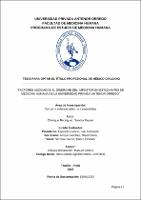| dc.contributor.advisor | Chávez Rimarachin, Manuel Bertoni | |
| dc.contributor.author | Chiroque Rodriguez, Sandra Raquel | |
| dc.creator | Chiroque Rodriguez, Sandra Raquel | |
| dc.date.accessioned | 2023-08-18T17:13:40Z | |
| dc.date.available | 2023-08-18T17:13:40Z | |
| dc.date.issued | 2023 | |
| dc.identifier.uri | https://hdl.handle.net/20.500.12759/11033 | |
| dc.description.abstract | Identificar los factores asociados al síndrome del impostor en estudiantes de cuarto, quinto, sexto año de Medicina Humana de la Universidad Privada Antenor Orrego durante el periodo del semestre 2023-1.
Material y métodos: Se llevó a cabo un estudio analítico, observacional, transversal en el que se incluyeron a 137 participantes de cuarto, quinto y sexto año de Medicina Humana de la Universidad Privada Antenor Orrego que cumplieron con los criterios de selección. Se aplicó una encuesta virtual donde se estudió variables sociodemográficas y la Escala del Fenómeno del Impostor de Clance (CIPS). El análisis estadístico utilizado fue la prueba de chi cuadrado para variables cualitativas y la T Student y/o prueba de Mann-Whitney para variables cuantitativas.
Resultados: Se encuestaron a 137 estudiantes de medicina, donde se encontró que el 38,0% padecieron el síndrome del impostor de los cuales el 24,8% eran mujeres y el 13,1% hombres, asimismo, la media de edad fue 22,4 años. En el análisis estadístico de las variables intervinientes, se encontró una asociación significativa (p < 0,05) entre el síndrome del impostor y el entorno de estudio, metodología académica y el tiempo de estudio invertido en horas.
Conclusiones: Cuatro de cada diez estudiantes de medicina desarrollaron síndrome del impostor, predominando en el género femenino. El entorno de estudio, la metodología académica y el tiempo de estudio invertido son factores de riesgo para el síndrome del impostor. | es_PE |
| dc.description.abstract | “To identify the factors associated with the impostor syndrome in fourth, fifth, and sixth year students of Human Medicine at the Antenor Orrego Private University during the 2023-1 semester.
Material and methods: An analytical, observational, transversal study was conducted in which 137 participating from the fourth, fifth and sixth year of Human Medicine of the Antenor Orrego Private University who met the selection criteria were included. A virtual survey was applied where sociodemographic variables and the Clance Impostor Phenomenom Scale (CIPS) were studied. The statistical analysis used the chi-square test for qualitative variables and the T Student and/or Mann-Whitney test for quantitative variables.
Results: 137 medical students were surveyed, where it was found that 38,0% suffered from impostor syndrome, of which 24,8% were women and 13,1% men, likewise, the mean age was 22,4 years. In the statistical análisis of the intervening variables, a significant association (p < 0,05) was found between the impostor syndrome and the study environment, academic methodology and the study time invested in hours.
Conclusion: Four out of ten medical students developed impostor syndrome, predominantly in the female gender. The study environment, the academic methodology and the invested study time are risk factors for impostor syndrome | en_US |
| dc.description.uri | Tesis | es_PE |
| dc.format | application/pdf | es_PE |
| dc.language.iso | spa | es_PE |
| dc.publisher | Universidad Privada Antenor Orrego | es_PE |
| dc.relation.ispartofseries | T_MED_3541 | |
| dc.rights | info:eu-repo/semantics/openAccess | es_PE |
| dc.rights.uri | https://creativecommons.org/licenses/by/4.0/ | es_PE |
| dc.source | Universidad Privada Antenor Orrego | es_PE |
| dc.source | Repositorio Institucional - UPAO | es_PE |
| dc.subject | Síndrome del Impostor | es_PE |
| dc.subject | Rendimiento Académico | es_PE |
| dc.title | Factores asociados al síndrome del impostor en estudiantes de Medicina Humana de la Universidad Privada Antenor Orrego | es_PE |
| dc.type | info:eu-repo/semantics/bachelorThesis | es_PE |
| thesis.degree.level | Título Profesional | es_PE |
| thesis.degree.grantor | Universidad Privada Antenor Orrego. Facultad de Medicina Humana | es_PE |
| thesis.degree.name | Médico Cirujano | es_PE |
| thesis.degree.discipline | Medicina Humana | es_PE |
| dc.subject.ocde | https://purl.org/pe-repo/ocde/ford#3.02.27 | es_PE |
| renati.advisor.orcid | https://orcid.org/0000-0003-1229-0036 | es_PE |
| renati.author.dni | 48617646 | |
| renati.advisor.dni | 18162927 | |
| renati.type | https://purl.org/pe-repo/renati/type#tesis | es_PE |
| renati.level | https://purl.org/pe-repo/renati/level#tituloProfesional | es_PE |
| renati.discipline | 912016 | es_PE |
| renati.juror | Espinola Lozano, Joel Hernando | |
| renati.juror | Arroyo Sanchez, Gisel Eliana | |
| renati.juror | Serrano Garcia, Marco Orlando | |
| dc.publisher.country | PE | es_PE |




